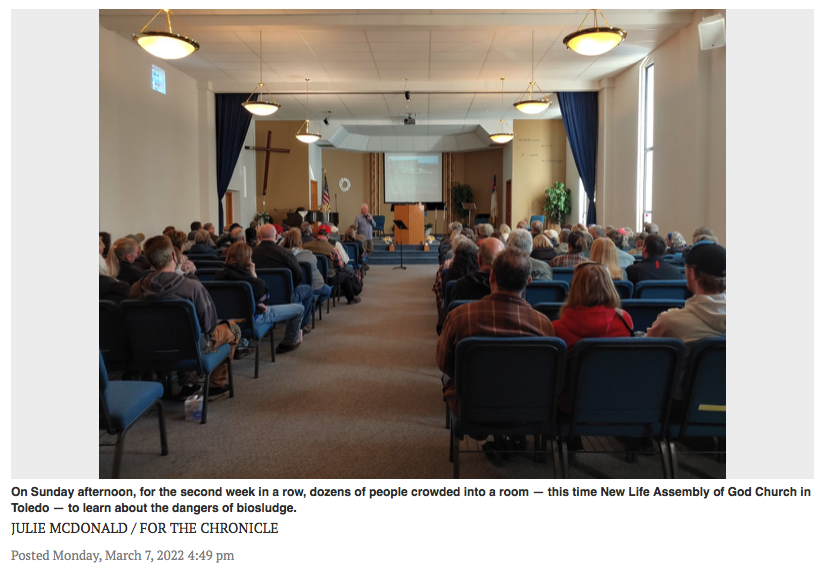
Posted Monday, March 7, 2022 4:49 pm
By Julie McDonald / For The Chronicle
When I heard about plans for spreading biosludge on Layton Prairie, I cringed.
For more than three decades, I listened to my sister-in-law Linda Zander recount the dangers of human waste spread on agricultural land that she said destroyed the dairy farm she and my brother-in-law operated for 26 years near Lynden. She collected more than 75 boxes filled with documents, photos, diaries, test results and testimonials for use as evidence in lawsuits. She said heavy metals — zinc, copper, lead and manganese — left behind by sludge spread on an adjacent neighbor’s 70-acre field sickened many of their 150 dairy cows and contaminated their wells. She contended contaminated well water gave my brother-in-law Ray Zander nickel poisoning and caused neurological damage in their grandchildren. She said 16 families experienced illness from the sludge.
During her battle, Linda founded an organization called Help for Sewage Sludge Victims and contended she often faced harassment and threats.
She filed a lawsuit in Whatcom County Superior Court against the haulers, the municipalities dumping the sludge and the neighbors who let it be spread on their farmland, but it was dismissed by summary judgment Oct. 8, 1993. She appealed, but the Washington Court of Appeals affirmed the trial court decision July 31, 1995, and the Washington Supreme Court refused to review the decision.
The expensive legal battle basically cost Ray and Linda their dairy farm, according to their eldest son, Robert Zander. Years ago, his dad told him, sludge would be spread occasionally on fields throughout the region, but when they repeatedly spread and concentrated it on fewer fields, problems occurred.
We live in the country, so we expected to smell the occasional stench of manure from cattle or cleaned-out chicken barns. That’s part of life in a rural community; farms were here long before we arrived.
But with biosolids, Robert said, every day it smelled like the overflow from a septic tank.
On Sunday afternoon, for the second week in a row, dozens of people crowded into a room — this time New Life Assembly of God Church in Toledo — to learn about the dangers of biosludge. That’s because the state Department of Ecology is processing a permit allowing Tribeca Transport LLC to begin spreading class B biosolids on 210 acres of Layton Prairie farmland owned by Dan Ritola.
Opponents organizing to fight the biosludge disposal have created a Facebook page called Toledo Citizens Against Biosludge. Lewis County commissioners have invited people to attend a meeting Tuesday, March 15, at 11 a.m. to discuss the issue.
At Sunday’s meeting, environmental activist Richard Honour, of Bothell, discussed biosolids, which he calls toxic sewage sludge. Honour, a longtime cancer researcher who founded Save Our Soil and The Precautionary Group, shared a PowerPoint presentation discussing toxic chemicals in biosludge and showing photos of plastics and other debris remaining in sludge dumped on farms and in forests.
“For many years I’ve been working in the field of toxic waste, toxicology, cancer, infectious diseases, and it always leads into the business of sewage sludge and other forms of toxic waste,” he said.
Last week, Honour spoke of the dangers in human sludge, especially from patients treated with chemo, a drug designed to kill human cells, as well as hospital wastes, bacteria, viruses, dioxins, PCBs, asbestos, industrial waste, heavy metals and other hazards.
“For some reason, in Washington state, we live under the delusion that growing our food in extremely toxic waste is good news and is beneficial to the economy because farmers get a break from buying very expensive commercial fertilizers,” Honour said. “But the costs to us in our county and our state are extraordinary.”
He noted that each year, more than 6,000 Loop double-dump trucks haul away biosolids from King County’s five wastewater treatment plants, much of it to Eastern Washington counties to spread on farmland and ranches. With increasing transportation costs, and Lewis County’s proximity to Seattle, he urged local residents to fight to keep out biosolid disposal.
He and his colleagues have recommended a sludge reduction plant to treat biosolids and use what remains to produce energy.
Honour said the distinction between Class A, Class B and Exceptional Quality sewage sludge is “totally an artificial construct.”
“The point here is that no matter what class they assigned to it, it’s all toxic waste,” he said.
He asked repeatedly “what’s in it?” and answered with test results he and other environmental activists have gathered showing as many as 400,000 possible toxins. When he posed questions to King County officials, he said, they declared it safe, saying they comply with regulations for cleaning biosolids before disposal.
“I worry about dead people,” he said.
He urged opponents to contact the state Department of Ecology, state and local lawmakers, and congressional representatives to prevent the spread of biosludge.
“That seems to have nationally the biggest impact,” he said.
As I watched the PowerPoint, I thought of Linda Zander and her crusade against toxic wastes in sewage sludge. I thought of Robert “Bob” Guenther, a labor lobbyist who said a week ago he’s been fighting biosolids in Lewis County for 20 years. He has filed a lawsuit against the state Department of Ecology through the Pollution Control Hearings Board. A trial is scheduled the last week of April.
Guenther lives near Fire Mountain Farms, a family-owned company in Onalaska that has been paid since 2002 to dispose of biosolids on a half dozen or so Lewis County properties, including near Onalaska, Cinebar and Napavine.
Neighbors worry about rising nitrate levels contaminating land and water, jeopardizing reproductive health and increasing cancer risks. E. coli and other bacteria as well as lead, mercury, zinc and cadmium are supposed to be removed from sludge during treatment.
“They’re going to hear my story before I’m done — with what Fire Mountain has done,” Guenther said a week ago during a Sunday meeting in Tom and Sharon Layton’s barn. He urged people to contact county commissioners, state legislators, the Department of Ecology and the Pollution Control Hearings Board and file a lawsuit as he did.
Congress banned dumping municipal sewage sludge in the ocean in 1992. Washington state advocates returning treated sludge to the land. The state Department of Ecology regulates the pace for safely applying biosolids to land.
The county doesn’t have permitting authority over biosolids, according to Lewis County Manager Erik Martin. However, he said county commissioners are planning to meet with Department of Ecology officials to discuss the issue.
A search of the internet brings up stories of Linda’s battle against biosludge, with much of it documented on a site called deadlydeceit.com, described as the sludge/biosolids diary of Jim Bynum.
“Linda learned the hard way that the regulatory agencies (county, state and federal) who are responsible for ensuring the health and well-being of its citizens will do nothing to help them,” thedeadlydeceit.com website stated.
Eventually, the Zanders lost their dairy farm — and added a caveat to the titles saying the land was contaminated by the toxic sludge. Then they moved into Everson.
“As a result of their exposure, through both air and water, to the various toxic contaminants in the sewage sludge, the odds of this middle-aged couple living to ripe old age are slim to none,” deadlydeceit.com stated decades ago.
Fortunately, that didn’t happen. Ray passed away in April 2020 at the ripe age of 86, while Linda remains alive in her early 80s, although she recently suffered a stroke.
•••
Julie McDonald, a personal historian from Toledo, may be reached at memoirs@chaptersoflife.com.
To read the article in The Chronicle click here.




